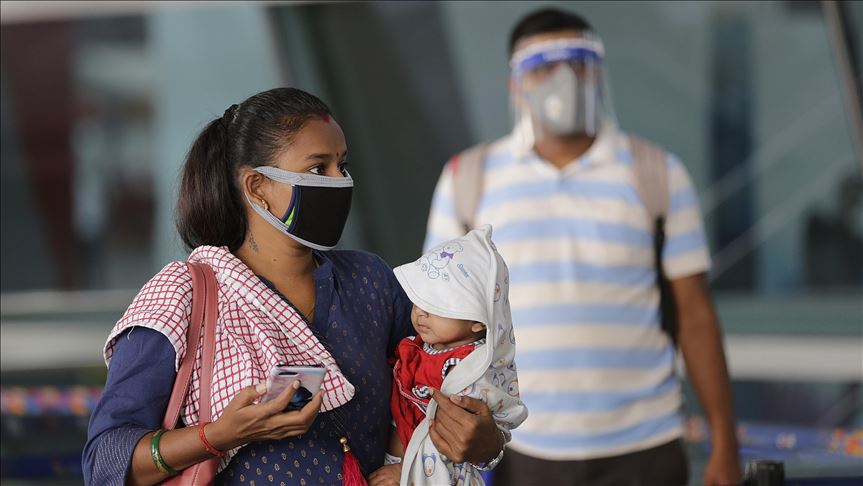COVID-19: Is Indian healthcare system heading for collapse?
Data and anecdotal evidence show India's healthcare system unprepared to handle jump in virus cases as lockdown is lifted

NEW DELHI, India
Kuldeep Kumar has been in a fit of rage since he lost his mother last weekend. The family had to fight tooth and nail to get Ranbiri Devi treatment for cancer and COVID-19, as most hospitals denied her admission.
When after a long struggle, the family finally managed to get a hospital bed, she died due to the delay in treatment.
Devi, 53, was undergoing gall bladder cancer treatment at a Delhi state-run hospital when she tested positive for the coronavirus. Soon after her COVID-19 reports came out, the hospital asked her to leave since they were not dealing with COVID-19 patients.
“The hospital authorities discharged her and asked us to take her elsewhere. We took her to a few other COVID-19 hospitals, all of which denied admission, citing an unavailability of beds,” Kumar told Anadolu Agency.
The family finally approached a social activist and human rights lawyer who intervened to get Devi admitted at a private hospital under the ‘Economically Weaker Section Quota.’ But Devi died from the delay in treatment a day after she was admitted.
According to the Johns Hopkins Coronavirus Resource Center in the US, India currently has more than 276,000 confirmed cases and 7,750 deaths from COVID-19.
As the number of infections surges in India, patients are finding it difficult to get admitted to coronavirus-designated hospitals.
With the capital New Delhi reporting over 1,000 cases a day, most hospitals are running at full capacity and beds are filling up fast. At present, with 8,500 hospital beds dedicated to COVID-19 treatment, the city had 17,712 active cases (29,943 cumulative).
The total number of coronavirus cases in the western state of Maharashtra, home to the financial capital of Mumbai, has risen to 85,975, surpassing China's total tally of around 84,000 cases, while 3,060 deaths have been reported in the state.
In Mumbai, alone, of the total bed capacity of 9,092 at dedicated hospitals, 8,570 beds or 94% are occupied. Of the 1,097 intensive care unit beds, 98% are occupied. Some 378 patients are on ventilators, while the total ventilator capacity in India’s commercial hub is 442.
Health Infrastructure of India
In the 2019 Global Health Security Index, which measures pandemic preparedness for countries based on their ability to handle the crisis, India ranked 57, lower than the US at 1, the UK at 2, Brazil at 22, and Italy at 31, suggesting it is more vulnerable to the pandemic than countries that have seen a high number of fatalities so far.
India’s low investment in the health sector, dedicating only 1.3% of its GDP, is now making it vulnerable to COVID-19. It contrasts with other developing countries such as Brazil, which spends 7.5% of its annual GDP on health, Bhutan, which has allocated 3.6%, and Bangladesh, which dedicates 2.2%.
Among developed nations, South Korea has kept its healthcare expenditure at a whopping 8.1%, Japan 10.9%, and the US at 8.5%.
India has a severe shortage of healthcare workers. According to the Health Ministry data released in October last year, there is one doctor for every 11,082 people, which is more than 10 times the doctor-patient ratio that the World Health Organization (WHO). The WHO mandates that the doctor to population ratio should be 1:1,000, while India had a 1:1,404 ratio as of February 2020.
In rural areas, this doctor-patient ratio is as low as 1:10,926 doctors as per National Health Profile 2019.
According to data from the Organization for Economic Co-operation and Development available for India for 2017, India has 0.53 beds for 1,000 people compared with 0.87 in Bangladesh, 1.1 in Indonesia, 2.11 in Chile, 2.73 in Turkey, 1.38 in Mexico, 4.34 in China and 8.05 in Russia.
In a recent study, the Center for Disease Dynamics, Economics & Policy (India) and Princeton University said the country currently has 713,986 beds, including 35,699 in intensive care units, and 17,850 ventilators for 1.3 billion people.
What do the experts say?
Dr. Anant Bhan, an adjunct professor in global health at Yenepoya University in India, said the current scenario shows poor planning and lopsidedness on the government’s part.
“It is confusing and disappointing that the country with some of the biggest IT companies [in the world] has failed to build systems that give clear information on the availability of beds or provide online help," said Bhan, who is also a researcher in bioethics and health policy.
"With lost opportunities, we may see a bigger crisis with the upcoming dengue and malaria season,” he told Anadolu Agency.
Many experts have reiterated that the first phase of India’s nationwide lockdown in March, which was extended for 21 days, was borrowed time to make frantic preparations. There was no way to control the virus, but the lockdown period massively failed due to misplaced prioritization.
In a recent letter to the Indian Journal of Medical Sciences, Dr. Anoop Saraya, head of the Gastroenterology and Human Nutrition Unit at the All India Institute of Medical Sciences, slammed the government’s response to COVID-19.
“Open and transparent sharing of data with scientists, public health experts and the public at large will strengthen pandemic control measures and help in building a bottom-up consensus in India,” wrote Dr. Saraya.
Transparency in terms of making details of discussions and decisions of scientific advisors to the government public would give the wider scientific community a chance to offer constructive criticism on policies and perhaps help in course corrections, he underlined.
Anadolu Agency website contains only a portion of the news stories offered to subscribers in the AA News Broadcasting System (HAS), and in summarized form. Please contact us for subscription options.







